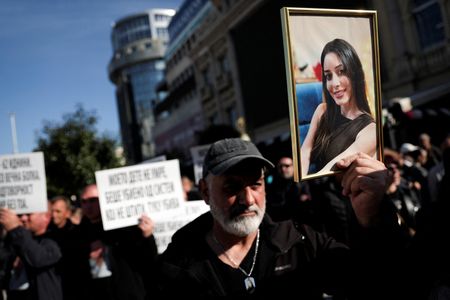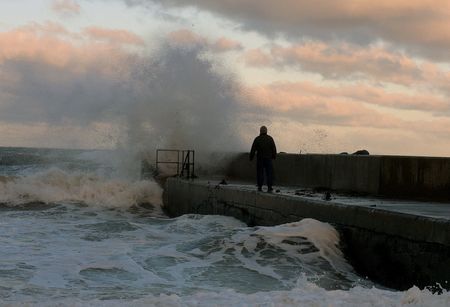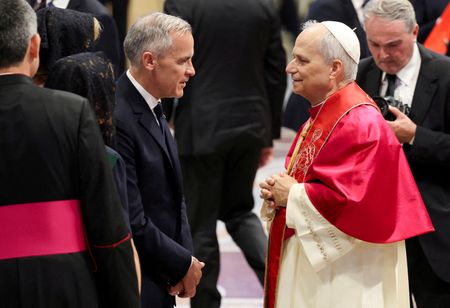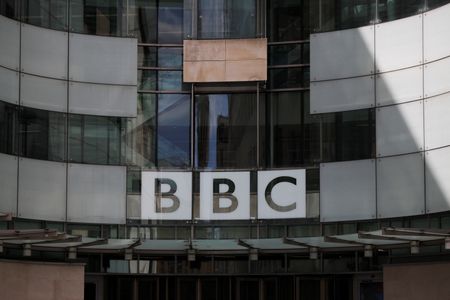By Miguel Lo Bianco and Simon Jessop
BELEM, Brazil (Reuters) -Thousands of climate protesters marched through the Brazilian city of Belem on Saturday in a noisy, diverse and peaceful display to demand more action to protect the fate of the planet and to vent their anger at governments and fossil fuel industries.
A short distance away, negotiators reached the halfway point in the marathon COP30 climate summit, which seeks to turn years of promises into action to halt rising global temperatures and deliver support to those most affected by a warmer planet.
On the streets Indigenous people, young activists and civil society groups came together singing, playing musical instruments and waving banners in midday temperatures near 30 degrees Celsius (86 degrees Fahrenheit).
The tropical city’s high humidity made that feel closer to 35 C (95 F), according to data from Brazil’s National Institute of Meteorology.
“This is a place for us to march and draw up a roadmap for what needs to be done at this COP: a transition away from deforestation and the use of fossil fuels,” Brazil’s environment minister Marina Silva said, addressing the crowds.
Indigenous protester Cristiane Puyanawa joined the march to call for greater land rights.
“Our land and our forest are not commodities. Respect nature and the peoples who live in the forest,” she said.
COP30 has already seen myriad protests, most notably an attempt to force entry to the venue by Indigenous people that resulted in clashes with security on Tuesday.
On Saturday, designated as a day of protest in the two-week COP summit, there was a huge security presence around the venue, including military police in riot gear, even though the march route did not directly pass it.
COP30 TALKS TO MOVE INTO POLITICAL PHASE
Negotiators shared their progress in a plenary meeting on Saturday before they hand their work over to national ministers to grapple with remaining political obstacles.
“As negotiators approach week two, they need to remember that climate action isn’t about abstract numbers or distant targets. It’s about people,” said Katharine Hayhoe, chief scientist at The Nature Conservancy non-profit.
“Every choice we make today determines the future we will share tomorrow.”
The sprawling summit agenda covers a huge range of issues with the intention of building on past years’ deals – an often inch-by-inch process that over three decades has delivered some progress, but not enough.
What will emerge from this year’s summit remains unclear, with some of the most controversial issues being discussed outside the formal process – such as increasing climate finance, moving away from fossil fuels, and addressing a collective shortfall in emissions-cutting plans.
Brazil’s COP30 presidency, which is steering those sideline discussions, must decide if it wants to attempt a high-stakes balancing act and come up with a political agreement on those issues that can be endorsed by all – known in COP parlance as a ‘cover decision.’
Asked on Saturday about such a deal, COP30 President Andre Correa do Lago told a news conference:
“For a long time, I’ve been saying that we are not planning a cover decision, but I also said that if there is a movement from the countries to propose a cover decision, the presidency will obviously take it into consideration. So, let’s see how things evolve.”
PUSH FOR NEW TAXES TO RAISE CLIMATE CASH
Elsewhere at COP, countries laid out new alliances and initiatives.
A group called the Premium Flyers Solidarity Coalition, which is planning to tax premium air tickets and private jets, said that Djibouti, Nigeria and South Sudan were joining the effort, which already includes France, Spain, Kenya and Barbados.
With Western governments slashing foreign aid, the idea of imposing “solidarity levies” on polluting sectors is gaining traction for generating debt-free money to fund climate action.
“If this COP has made anything clear, it is that the next decade must be one of acceleration powered by non-debt finance,” said Selwin Hart, special adviser to the U.N. Secretary-General.
The Utilities for Net Zero Alliance group of companies said it raised its investment target from about $116 billion per year to nearly $150 billion, including $66 billion for renewable energy and $82 billion on electricity grids and batteries.
(Reporting by Sebastian Rocandio, Miguel Lo Bianco, Lisandra Paraguassu, Simon Jessop and William James; Editing by Richard Valdmanis, Andrea Ricci and Diane Craft)












